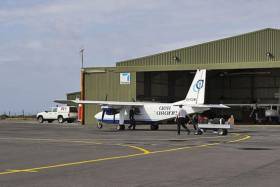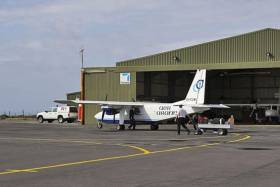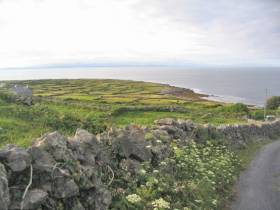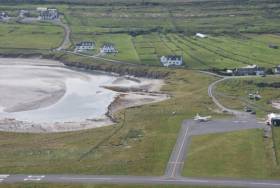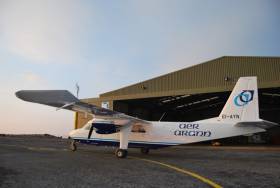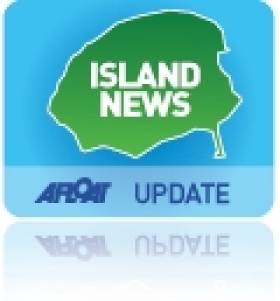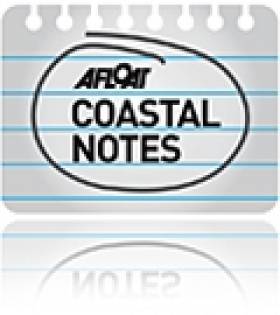Displaying items by tag: transport
Deadlock Over Aran Islands Flights Deal
#AranIslands - The Aran Islands air service is still without a mainland airport as the deadline for talks on the €3.6 million contract fast approaches, according to The Irish Times.
As previously reported on Afloat.ie, the Department of the Gaeltacht has been in a stalemate with the owners of Connemara Airport – who presently hold the tender for the Galway Bay islands' air link – over the cost of the Public Service Obligation contract.
Prices offered by Aer Arann Islands, which factor in refurbishment and staffing costs, have become a sticking point with the department.
However, one last effort will be made to reach a deal before the deadline next week, according to Minister of State for the Gaeltacht Seán Kyne.
“We cannot pursue a contract if we don’t have an airport," said Minister Kyne, "and at the moment, we don’t have agreement on those terms.”
The Irish Times has more on the story HERE.
Aran Islands Flights Up In Air Over Airport Disagreement
#AranIslands - The Department of the Gaeltacht is in a stand-off with the owners of a Connemara airport that's once again thrown the future of the Aran Islands air service into doubt.
According to Galway Bay FM, the deadline for tenders for the Galway Bay islands' decades-old air link to the mainland had been set to expire at noon yesterday (Friday 3 June).
But it's been extended for another fortnight after the department failed to come to terms with the owners of the airport at Inverin over the cost of the Public Service Obligation contract.
The airport, near the ferry link at Rossaveal, was selected as the mainland terminal for the new air tender two months ago, as previously reported on Afloat.ie.
Subsequent concerns over the potential for increased fares or the replacement of the aeroplane link with a helicopter service – as per the controversial tender late last year – were not entertained by the department citing the ongoing tender process.
#AranIslands - The Minister for the Gaeltacht has backed out of a scheduled meeting with Aran Islands residents over the latest tender for the area's air service, as Galway Bay FM reports.
Locals had been hoping to meet with Minister Joe McHugh to express concerns over potential increased fares for the air route across Galway Bay from the islands to the mainland west of Galway city.
The replacement of the islands' decades-old aeroplane link with a helicopter service, as was mooted in the controversial tender cancelled at the last minute in late 2015, has also not been ruled out.
But the meeting originally set for tomorrow (Thursday 7 April) has been cancelled after departmental officials advised it would be inappropriate while the latest tender is underway.
Just days ago the airport at Inverin in Connemara was selected as the mainland terminal for the new Public Service Obligation air service tender, as previously reported on Afloat.ie.
Galway Bay FM has more on the story HERE.
#AranIslands - Inverin near Rossaveal in Connemara has been selected as the mainland terminal for the new Aran Islands air service tender, as Galway Bay FM reports.
The news will be some consolation to islanders angered by last year's award of the tender to Executive Helicopters, who planned to fly from the islands to Carnmore some 50km to the east of the Rossaveal ferry link.
That tender was cancelled at the end of September, with the previous contract with Aer Arann Islands later extended at the 11th hour, though it is set to expire this coming October.
More recently, MEP Marian Harkin visited the European Commission with two locals to voice their concerns over the particulars of any new tender for the vital air connection between the Aran Islands and the mainland.
Galway Bay FM has more on the story HERE.
#AranIslands - Cost should not be the only consideration when it comes to providing air services to the Aran Islands, according to the European Commission.
That was the outcome from a meeting between Brussels officials and MEP Marian Harkin, who was accompanied to EC headquarters this week by two Aran Islanders to voice their concerns over the tender for flights between the mainland and the Galway Bay islands, as Galway Bay FM reports.
Harkin raised the same issue a month ago in the European Parliament as she called for attention to transport provision for all offshore communities for the EU.
Though the European Commission cannot dictate the terms of such provisions, officials have expressed their expectation that the needs of islands be taken into consideration in any tender contract.
The existing agreement with Aer Arann to provide flights between the islands and Galway was extended at the 11th hour last year after protests against its planned replacement with a helicopter service, but expires this coming October.
Aran Islands Transport Issues Raised In Brussels
#AranIslands - Transport woes in the Aran Islands was raised by MEP Marian Harkin in the European Parliament this week, according to Galway Bay FM.
Calling for attention to all offshore communities in the EU, Harkin highlighted the need for better air and ferry services to arrest depopulation fears, as Galway Bay FM reports.
Islanders have had something of a reprieve since the Government reached an interim deal four months ago to continue flights to the mainland, though the contract for that service will expire in October.
Moreover, ferry services to the chain's largest island Inis Mór were recently threatened over a dispute regarding a contentious passenger levy for the non-PSO transport route, as previously reported on Afloat.ie.
Negotiations Continue Over Aran Islands Air Service Contract
#AranIslands - Further negotiations are planned after "positive" early discussions between the Government and Aer Arann over the proposed continuation of the Aran Islands plane service, according to RTÉ News.
The airline has put its staff of 40 on protective notice, as The Irish Times also reports, but jobs and flights after tomorrow (Wednesday 30 September) are not guaranteed until an agreement has been reached.
It is understood that the State has asked the airline to extend its Public Service Obligation contract for air services to the Aran Islands, following last Friday's about-face over its tender for the route.
That new contract, had it gone ahead, would have seen plane flights to the Galway Bay islands replaced with a helicopter service that faced opposition from local residents.
Govt Cancels Tender For Aran Islands Helicopter Service
#AranIslands - The Government last night cancelled the tender process for flights to the Aran Islands amid weeks of concern over changes to the Galway Bay islands' air service.
As RTÉ News reports, Minister of State for Gaeltacht Affairs Joe McHugh said the European Commission would be notified before beginning a new tender process, and his department would enter talks with the existing provider Aer Arann about continuing their service after their current contract expires next week.
The decision means that the decades-long airplane service will now not be replaced by helicopter flights out of Carnmore, which were to be provided by the State's preferred tenderer Executive Helicopters.
As previously reported on Afloat.ie, residents had expressed worry and anger over the change, with dismay over the distance between Carnmore and the ferry link at Rossaveal, and concerns over the reliability of helicopter service in often severe weather around the islands.
Only last week public meetings has been held on Inis Mór, Inis Meáin and Inis Oirr to address the uncertainty over the future of the air service.
It since emerged that the Department of the Gaeltacht itself had no confirmation that Galway Airport could be used as a hub for the helicopter service - until Galway councillors passed a motion against it.
As of yesterday (Friday 25 September), Aer Arann had issued no statement over the situation under legal advice after mounting a High Court challenge to the original tender.
And Galway Bay FM adds that helicopters are expected to be eliminated as an option from any new tender contract for Aran Islands flights.
New Tender Cuts Funding To Aran Islands Air Service
#IslandNews - Aran Islanders have expressed concern over a new tender for the air link to the Galway Bay islands that could see a significant reduction in services.
As The Irish Times reports, the new tender for the public service obligation air connection has been capped at €900,000, representing a 30% cut.
And this "major downgrading" will inevitably result in restricted airport opening hours and a rise in fares, according to an Coiste leis an Seirbhís Aeir a Chosaint (the Save our Air Service committee).
The news comes a year after ferry visits to the Aran Islands were shown to have fallen by 20% – and just a few months after nine offshore island communities spoke out over Government plans to stop core funding for development.
The Irish Times has more on the story HERE.
Road To Dingle Gets a Welcome Upgrade
#Dingle - The Minister for Transport, Tourism & Sport has officially opened a newly upgraded section of the main road to one of Ireland’s most popular coastal towns.
Minister Leo Varadkar opened the new section of the N86 road outside Annascaul which lies on the main route from Tralee to Dingle, and which is used by thousands of local residents and thousands more tourists every year.
The project cost around €9 million and was funded by the Department of Transport, Tourism & Sport. It was overseen by the National Roads Authority (NRA) and Kerry County Council and was completed in around 16 months.
Speaking at the launch, Minister Varadkar said: "This is an important project for West Kerry and the whole county, and will make a big difference to journeys in the area.
"But it has also national significance, as thousands of tourists travel along the N86 every year in order to reach Dingle, one of our premier tourism destinations."
He added: “Although the old N86 had its charms, it was also very narrow, and the stretch which we have upgraded had a number of dangerous junctions leading on to side roads. These have now been replaced and will make a big difference to safety levels.
"The new road is wider at 3 metres, and also provides a hard shoulder in each direction. I’m also very pleased that we have been able to offer cycle and pedestrian facilities along this stretch.”
In the longer term, the NRA plans to upgrade the entire length of the N86 between Dingle in the west of the peninsula, and Camp on the northern side.
The plan is to develop the 27km project as one of four Tourist Route Pilot Schemes, including cycle schemes and pedestrian access.
Similar schemes have already opened along the N59 near Clifden, Co Galway, the N59 at Kilbride, Co Mayo and the N56 at Glenties, Co. Donegal.
The proposal for the N86 would considerably improve safety levels and journey times in West Kerry, and improve road surfaces in the villages of Lispole, Annascaul and Camp on the Dingle Peninsula.


























